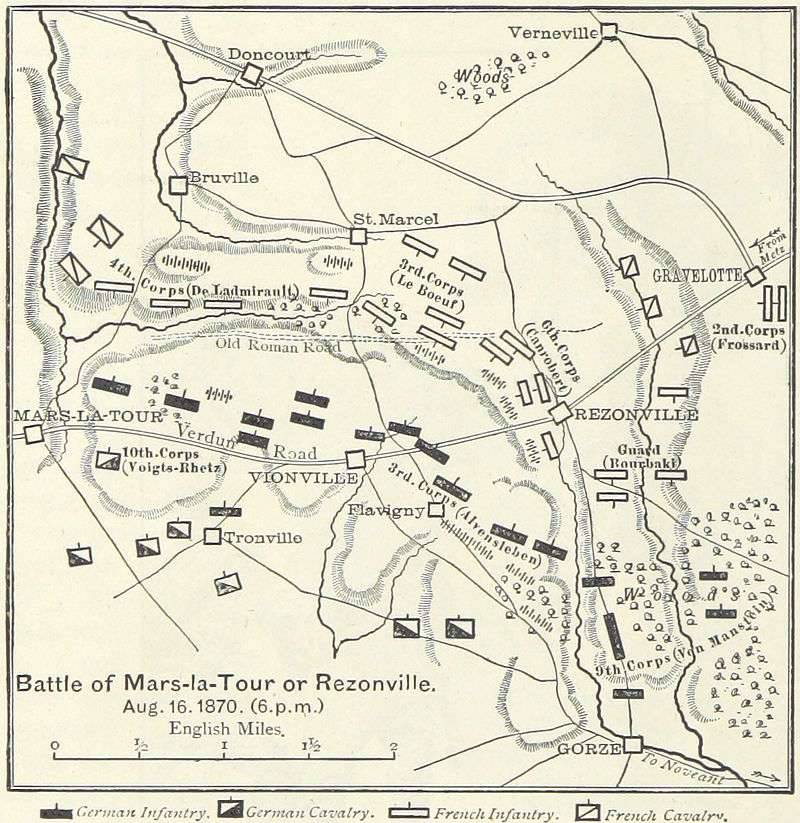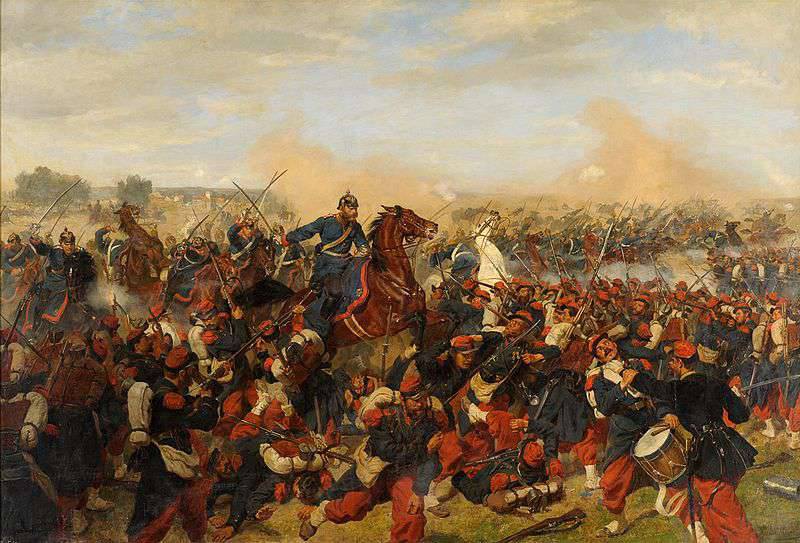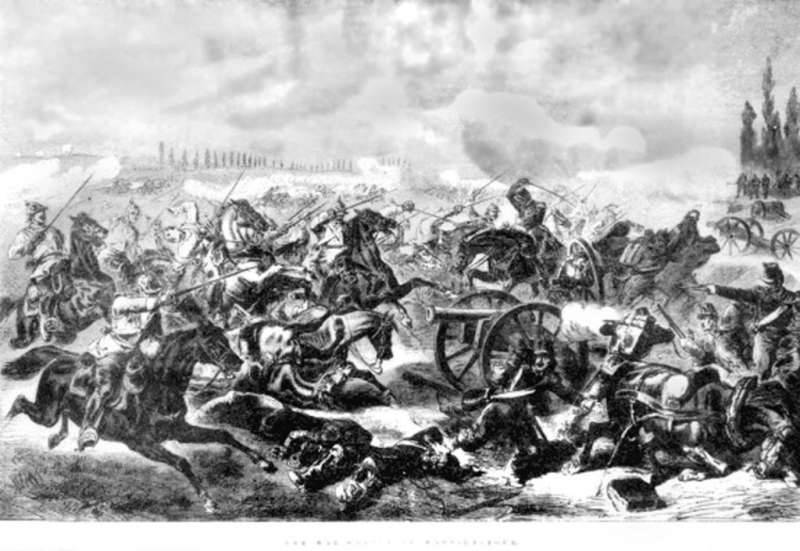Battle of Mars-la-Tour
The battle of Colombey-Nuilia did not bring victory to either one or the other side, but this battle for the whole day delayed the crossing of the French troops through the Moselle. This forced delay in the course of further hostilities led to dire consequences for the French army. 16 and 18 August 1870 French troops had to endure two new battles imposed on them, one at Mars-la-Tour, the other at Saint-Privat. These battles completed the strategic defeat of the French Rhine Army. Bazin was prevented from retreating to join up with MacMahon at Chalon and shut up with the army at Metz. German 1-I and 2-I armies blocked the French in Metz, and 3-I army, without passing the Vosges, made a march to Paris. In parallel, she moved to Paris and 4-I German army. It was a disaster.
Battle of Mars-la-Tour
After the battle of Colombey-Nuilie 14 in August 1870, the French continued the interrupted retreat, but for the day of August 15, no more than 1 miles from Metz were passed. Only the cavalry was advanced a little further along the two roads to Verdun. From the German 2 Army, the 3 Corps of Konstantin von Alvensleben crossed the Moselle on the undisturbed bridge at the Novean and on the crossings arranged by the pontoon, but had to send its artillery round the Pont-a-Muson. German cavalry collided in the area of Mars-la-Tour with the French cavalry. But when the 24 Prussian squadron gathered here in the afternoon, the French cavalry moved to Vionville.
The French and 16 August did not cope with a performance from Metz. The guards blocked all roads. Only the emperor, guarded by two cavalry brigades, left early in the morning on a safer road through Eten. Since the right wing could not yet speak, the performance was postponed for the afternoon, and the left wing troops already lined up returned to their stands. The slowness of the French army was linked to Bazin's personal interest. The French might well have had time to go to Chalon and avoid failed battles, but Bazin sought to keep his army intact and therefore deliberately hesitated, not wanting to leave the Metz. This allowed the Prussians to block his path and impose bloody battles.
Under the cover of cavalry, Major Kerber, with four batteries, approached Vionville itself, and the French cavalry, caught off guard by its fire, ran back through the infantry bivouacs. However, the French infantry immediately became a gun in good order, and the artillery opened heavy fire. First, the Prussian artillery departed. Fearing that the enemy would be missed, General Alvensleben with the 3 Corps (6 and 5 Divisions) began the battle. He believed that before him only the French rearguard. General Stülpnagel ordered the 10 Brigade to turn around and open fire on the enemy. Started a headlong fight. On the right, the Prussians, gradually moving forward, in a stubborn battle in the conditions of a wooded area, often hand-to-hand, near the 11 o'clock in the morning reached the ledge of the forest Saint Arnu against Flavigny. But the left wing of the Prussians was pushed aside, even artillery was in grave danger. The 52 th regiment had come to the rescue and restored the front, albeit with very serious losses. So, the 1 th battalion lost all officers, the banner passed from hand to hand several times. The brigade commander, General Dering, was also mortally wounded. General Stülpnagel rode off to the front line, encouraging the soldiers. General Schwerin gathered around him the remnants of his troops, who had lost their commanders, and with the help of the detachment of the 10 Corps kept height in Flavigny, from which the French retreated.
11-I brigade around 11 hour. 30 min. took Vionville. From here, the Prussians attacked Flavigny. Flavigny was taken by storm. As a result, Vionville, Flavigny and the northern ledge of the forest of Saint-Arnu formed the strongholds of the Prussian front, turned to the east. This front was almost a mile long. In this case, all the infantry and artillery, located here in one line, were drawn into a fierce battle. Only 2 and 5 cavalry divisions and half of the 6 brigade at Tronville were in the 37 echelon.
The French had very strong positions. Their position was covered from the left flank of Metz, from the right - with strong batteries on the old Roman road and numerous cavalry. The French army could confidently withstand the frontal attack of a strong opponent. Moreover, Bazin could crush the few Germans, who began the battle in isolation from the main forces. In general, the French marshal had to act offensively in order to free himself from the enemy standing directly in front of him and continue the march on Verdun and on to Chalon. From a military point of view, it is difficult to explain why Bazin was inactive. It was obvious that only a part of the German troops, and obviously a small one, could at that time be on the left bank of the Moselle; with the approach of the remaining divisions of the Metz during the day, the French had tremendous superiority of forces. However, Bazin was only concerned about the connection with Metz, and he focused mainly on his left wing only. He sent there all new reinforcements, and threw the entire Guards Corps and part of the 6 Corps against the Onon forest on the left flank, and from which the German troops did not follow the attack at all. Apparently, only political reasons prompted Marshal Bazin to decide to stay with Metz on this day and to refuse to take decisive actions against the enemy.

Meanwhile, Prussian troops, slowly but uncontrollably advancing from Flavigny and Vionville, with the most genuine support of their artillery, forced the right wing of the 2 French Corps to retreat to Rezonville. The retreat turned into a rout, and General Bataille and Valaz were killed. To stabilize the front, the French Guards Cuirassier Regiment bravely rushed to the attack. The Prussian infantry literally shot down the French cavalry, and two hussar regiments completed the rout. The Prussians decided to throw the 6 Cavalry Division into the breakthrough. However, the French command had already closed the gap with the fresh Guards Grenadier Division, which had been transferred from the unattached left wing. As a result, the Prussian cavalry, met with powerful rifle and artillery fire, was stopped and retreated.
At this point a decisive turn in the battle could have happened. At 2 one o'clock in the afternoon, General Alvensleben, constantly attacking, introduced the French in delusion regarding the forces of the enemy. But now the movement had stopped, the Prussian battalion forces were exhausted by the four-hour battle, the ammunition was running out. Behind the Prussian battle line there was not a single battalion, not a single battery in reserve. Prussian corps went on the defensive. The French had every chance of success, especially on the right flank, where they had strong artillery along the Roman road. The great power advantage allowed the French to spread more and more to the right, threatening the Prussians with full coverage.
In the center, Marshal Canrober launched a counteroffensive on Vionville. At the disposal of the Germans at this critical moment, there was only a small part of the 5 Cavalry Division. General Bredov led two regiments into battle — the Cuirassiers and Uhlans, each with three squadrons. The cavalry was able to pass through the hollow and rushed at the French. Overcoming artillery fire, the Prussians broke through the first line of infantry and artillery, chopping the cannon's servant. The second line of the French infantry also could not resist, and the French batteries began to retreat. Encouraged by the victory, the Prussian cavalry was fascinated and continued the offensive. As a result, the Prussians were already surrounded by French cavalry. The Prussian brigade did not have a second line, and it was forced to break through the ranks of the French cavalry and infantry without cover. Only half of the people returned to Flavini, where two squadrons were formed. However, this injection of Prussian cavalry stopped the French attack on Flavigny.
Around 3 hours, the 4 French divisions went on the offensive. Prussian infantry and cavalry in the area of the bushes of Tronville must retreat before such superiority of forces. However, it took the French an entire hour to overcome the stubborn resistance of the four Prussian battalions. At this time, the 3 Corps, which had fought alone for 7 hours, received reinforcements. The 10 Corps heard the artillery cannonade in the Vionville region and the Corps Commander General Fochts-Retz personally went to the battlefield and gave the necessary orders to the columns following in their wake. First of all, the artillery that had gone ahead energetically entered the battle.
The artillery fire of the 3 and 10 corps stopped the French offensive. Then the head parts of the 10 corps, with the support of the troops of the 3 corps, pushed back the enemy. In addition, parts of the 8 body began to come up. The 8 squad appeared in the 5 watch at the exit from the forest of Saint-Arnus and immediately attacked the altitude, but a three-fold attempt to capture it failed, because Marshal Bazin also greatly strengthened the position ahead of Rezonville. The French again went on the counteroffensive, but could not resist the well-aimed Prussian artillery fire and retreated. After that, both sides made small attacks several times, but without much success. As a result, the battle on the right flank was reduced to a mutual exchange of fire.
On the left flank, the German troops marched along the main road to Mars-la-Tour to go to the flank or rear of the enemy. In the meantime, the French extended their considerably reinforced right wing to the valley west of Brivilles and concentrated here three cavalry divisions. As a result, when General Wedel moved to the attack on both sides of Tronville who had been burning from the shelling, his team of only five battalions ran into the widely deployed front of the 4 French Corps. While advancing under heavy artillery and mitralese fire, both Westphalian regiments suddenly found themselves in front of a deep gully unnoticed before. Crossing it and rising to the opposite slope, they fell under the destruction fire directed against them from the closest distance and from different sides. Having lost almost all commanders and officers, the remnants of the German battalions fell back into the ravine. Several hundred soldiers were captured. The rest gathered at Tronville around the shot banner, which is held in the hand of the only one left on top, Colonel Krapach. 95 officers and 4 546 soldiers dropped 72 officers and 2 542 soldiers, i.e. more than half.
The French are pursuing the Germans, but they are stopped by a counterattack of squadrons of the 1 and 2 of the Guards Dragoon regiments, which act against the superior forces of the African horse rangers. The Prussians are all cash cavalry units, only around 16 squadrons, which unfold in two lines to the left of Mars-la-Tour. Around 7 hours of the evening there is a clash of large horse masses. Up to 5 thous. Horsemen participated in the melee. The battle ends in favor of the Prussians. General Montague, who was seriously injured, was captured, and General Legrand, hurrying with the dragoons to help his hussars, was killed. The French cavalry is crowded to the crossings through the valley of the creek at Brivilles. The retained forces of the French cavalry division Clerambo is trying to help his own. But the hussars galloping back and mistakes in management lead the advance team into disarray. The division is keen on the general flow and only the French infantry stops their flight. As a result, the German infantry was able to clean up and go to Mars-la-Tour in an organized way. And the French troops on their right wing refused to further attacks. It was the largest cavalry battle of the entire war.
At 7 hours of the evening, the commander of the 2 army ordered to continue the offensive. However, the forces were already exhausted, the ammunition was running out, the horses were 15 hours without feed and under the saddle. Part of the batteries could only move in increments, while the building closest to the left bank of the Moselle (12) was still in general moving from the battlefield. As a result, the 10 body was completely unable to execute this order. Only on the right wing of the artillery with infantry attacked in the area of Rezonville, but there came under heavy gunfire and artillery fire from both sides. Only from the French Guards corps operated from the flank of the 54 guns that advanced to this position. As a result, Prussian batteries had to return to their original positions. Then they tried to attack two brigades of the 6 Cavalry Division. But with the onset of darkness, they could barely discern the target of the attack and came under heavy fire. The cavalry moved back with considerable losses. As a result, the battle stopped around 11 hours of the evening.
Thus, the battle began with a sudden attack by the Prussian cavalry against the French at Vionville. Fearing that the enemy would be missed, General Alvensleben launched an offensive with the 3 Corps. With only one of his corps, he fought until the evening and pushed the enemy back from Flavigny to Rezonville, more than half a mile back. As a result, the Prussians began a battle with 20 thousand soldiers against 150-thousand. french army. At the second stage of the battle, the troops of the exhausted 3 corps went over to the defensive and withstood the French attacks only thanks to the reinforcements arrived. Gradually, units of the 10 and 8 corps arrived (troops of Hanover, Westphalian, Oldenburg, and later Hessians), in total up to 80 thousand soldiers. That is, the French still had about twice as much. However, Prussian troops continued to attack and bravely withstood all the attacks of the French. The Prussian cavalry was especially distinguished in the battles. The Battle of Mars-la-Tour has become one of the last battles in stories Western Europe, when the cavalry played a big role in the battle. It is also worth noting the excellent actions of the Prussian artillery, which allowed to restrain a more numerous enemy. With the support of the troops of the 10 Corps and with the help of the strongest counterattacks of cavalry and skillful artillery operations, Prussian troops survived. Because of the indecisive actions of the French commander-in-chief, Bazin, the French soldiers were unable to use their advantage and were mostly defensive.
The battle lasted with varying success until the evening. At night, Bazin ordered to stop trying to advance to Verdun. The French retreated 11 km back to Metz and stopped at the position of Saint-Privat - Gravelot, where a new battle soon erupted between Prussian and French troops.
The results of the battle remained uncertain. Both sides lost approximately 16 thousand people. But the Prussians managed to stop the retreat of the French army, which ultimately led to its decisive defeat.

To be continued ...

Information